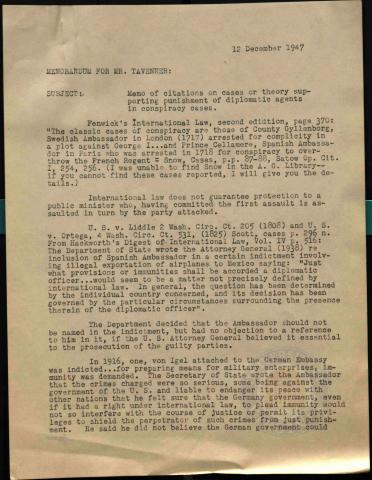
Page 1
| Parent | Memo of citations on cases or theory supporting punishment of diplomatic agents in conspiracy cases |
|---|---|
| Date | 12 December 1947 |
| Language | English |
| Collection | Tavenner Papers & IMTFE Official Records |
| Box | Box 6 |
| Folder | General Reports and Memoranda from December 1947 |
| Repository | University of Virginia Law Library |
12 December 1947
MEMORANDUM FOR MR. TAVENNER:
SUBJECT:Memo of citations on cases or theory sup¬
porting punishment of diplomatic agents in conspiracy cases.
Fenwick's International Law, second edition, page 370: "The classic cases of conspiracy are those of County Gyllenborg, Swedish Ambassador in London (1717) arrested for complicity in a plot against George I...and Prince Cellamere, Spanish Ambassa¬dor in Paris who was arrested in 1718 for conspiracy to over¬throw the French Regent = Snow, Cases, p.p. 87-88, Satow Op. Cit. I, 254, 256. (I was unable to find Snow in the A. G. Library— if you cannot find these cases reported, I will give you the de¬tails.)
International law does not guarantee protection to a public minister who, having committed the first assault is as-saulted in turn by the party attacked.
U. S. v. Liddle 2 Wash. Circ. Ct. 205 (1808) and U. S. v. Ortega, 4 Wash. Circ. Ct. 531, (1825) Scott, cases p. 296 n. From Hackworth's Digest of International Law, Vol. IV p. 516: The Department of State wrote the Attorney General (1938) re inclusion of Spanish Ambassador in a certain indictment involv¬ing illegal exportation of airplanes to Mexico saying: "Just what provisions or immunities shall be accorded a diplomatic officer...would seem to be a matter not precisely defined by international law. In general, the question has been determined by the individual country concerned, and its decision has been governed by the particular circumstances surrounding the presence therein of the diplomatic officer".
The Department decided that the Ambassador should not be named in the indictment, but had no objection to a reference to him in it, if the U. S. Attorney General believed it essential to the prosecution of the guilty parties.
In 1916, one, von Igel attached to the German Embassy was indicted...for preparing means for military enterprises, im¬munity was demanded. The Secretary of State wrote the Ambassador that the crimes charged were so serious, some being against the government of the U. S. and liable to endanger its peace with other nations that he felt sure that the Germany government, even if it had a right under international law, to plead immunity would not so interfere with the course of justice or permit its privi¬leges to shield the perpetrator of such crimes from just punish¬ment. He said he did not believe the German government could���
